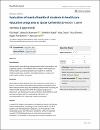Evaluation of mental health of students in healthcare education programs at Qatar University
| Author | Hayk, Ola |
| Author | Mansoor, Abdulla |
| Author | Al-Najdi, Shahd |
| Author | Daud, Alaa |
| Author | Chami, Rula |
| Author | Al-Hashimi, Najah |
| Author | Ali, Kamran |
| Available date | 2024-10-08T07:49:18Z |
| Publication Date | 2024 |
| Publication Name | MedEdPublish |
| Identifier | http://dx.doi.org/10.12688/mep.20055.1 |
| Citation | Hayk O, Mansoor A, Al-Najdi S et al. Evaluation of mental health of students in healthcare education programs at Qatar University [version 1; peer review: 2 approved]. MedEdPublish 2024, 14:37 (https://doi.org/10.12688/mep.20055.1) |
| ISSN | 2312-7996 |
| Abstract | Mental health issues among undergraduate health-care students are a growing concern. This research aims to explore the frequency of mental health issues among health-care students in medicine, dentistry, pharmacy, nutrition, biomedical sciences, nursing, and public health at Qatar University. Ethics approval was obtained from the institutional review board. A total of 1,378 health-care students were invited to participate. Data were collected online using two validated questionnaires including the Patient Health Questionnaire (PHQ-9) to assess symptoms of depression, and Depression, Anxiety, and Stress Scale (DASS-21), and two open-ended questions investigating risk factors and recommendations for enhancing institutional support. A total of 270 health-care students completed the survey; 227 female, and 43 male students. According to PHQ-9 cut-off values, 37.7% of students had mild depression symptoms, 25.5% moderate, 14.8% moderately severe and 10% severe symptoms. DASS-21 responses revealed 34.7% displayed severe to extremely severe anxiety symptoms, 15.4% severe to extremely severe stress symptoms and 21% severe to extremely severe depression symptoms. Students aged 18-21 years had significantly higher depression (p=0.03) and stress scores (p=0.05). Qatari students had significantly higher anxiety scores (p=0.05). Responses to open-ended questions were categorized into sub-themes and grouped together into broader themes. Most students reported exam stress and workload as key factors contributing to their negative mental health. Participants' recommendations included reducing academic workload through better curricular planning, providing training to faculty to better support students with mental health issues, and improving mental health services. This study showed a significant percentage of respondents reported symptoms of stress, anxiety, and depression during undergraduate studies. Participants represent the future healthcare force for the country and there is a need to identify and support students with mental health issues through close monitoring, and work with all stakeholders to improve student support services. |
| Sponsor | Open access funding for this paper was provided by the Qatar National Library. |
| Language | en |
| Publisher | Taylor and Francis Group |
| Subject | Anxiety; Depression; Healthcare students Education Mental health Stress |
| Type | Article |
| Volume Number | 14 |
Files in this item
This item appears in the following Collection(s)
-
Dental Medicine Research [436 items ]


